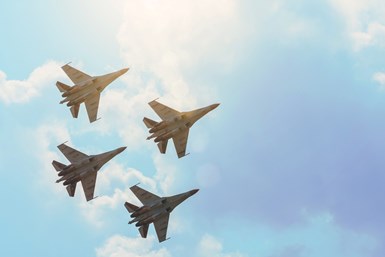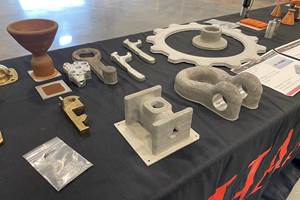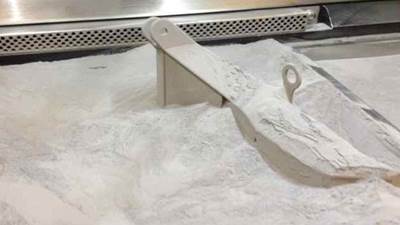America Makes Awards $3.2M for Delta Qual Project Winners
The project call winners are tasked with creating qualified additive manufacturing (AM) processes that offer rapid and affordable flexibility in crucial processes, postprocessing and material feedstock variables, while efficiently validating a qualified AM material through statistical analysis.
The National Center for Defense Manufacturing and Machining (NCDMM) and America Makes have awarded $3.2 million to the winners of the directed project call for the Demonstration of Novel Methods for Effective AM Process Qualification/Requalification — Delta Qualification. The effort is funded by the Air Force Research Laboratory (AFRL).
Additive manufacturing (AM) offers the U.S. Air Force (USAF) and commercial manufacturing sectors groundbreaking opportunities with its ability to quickly produce lightweight designs. However, these benefits cannot yet be fully realized due to the time and cost associated with AM material and machine development, and the generation of significant data through testing and analysis needed for qualification/requalification. Consequently, the agility of AM processes is hindered, making it challenging to respond to the technological advancements and shifts in the supply chain without first undergoing a costly and time-consuming requalification to ensure all rigorous standards for quality and safety continue to be met.
The chosen Delta Qual project teams will tackle these challenges by creating a qualified AM process that offers rapid and affordable flexibility in crucial processes, postprocessing, and material feedstock variables, while efficiently validating a qualified AM material through statistical analysis.
“We are excited to announce and celebrate the winners of this project call,” says Dr. Brandon Ribic, America Makes technology director. “Our membership and their collaborative partners consistently impress us with their ability to find dynamic solutions. These cutting-edge industry leaders, researchers and developers are revolutionizing additive technology and propelling it forward as the future of manufacturing. We have full confidence in their ability to devise optimal solutions to overcome the qualification/requalification challenges that slow the expansion of this innovative industry.”
Below is the list of award winners and related topics/projects:
Topic 1: Major Delta Qualification Demonstration
-
Project 1: Applying Machining Learning to Enable Effective Additive Manufacturing Process Qualification/Requalification
- Team Lead: Senvol
- Project Team: 3Degrees, AoZora Additive, ATI, Battelle, Boeing, Element Materials Technologies, National Institute of Aviation Research (NIAR), and Pilgrim Consulting
- Project 2: Model-Enabled Delta-Qual (MEDEL-QUAL)
- Team Lead: RTX (Raytheon)
- Project Team: Collins Aerospace Applied Research & Technology, Colorado School of Mines, Hexagon Manufacturing Intelligence, and Sentient Science Corporation
- Project 3: Rapid Qualification Pathway for Metal Additive Manufacturing Using Laser Powder Bed Fusion (LPBF) for Critical Applications
- Team Lead: EOS
- Project Team: 3Degrees, AddiGuru, NSL Analytical, and The Ohio State University
Topic 2: Minor Delta Qualification
- Project 1: Fatigue Allowable Curves and Effects of Texture and Thickness (FACETT)
- Team Lead: RTX Technology Research Center
- Project Team: Collins Aerospace Applied Research & Technology, Hexagon Manufacturing Intelligence, Sentient Science Corporation
- Project 2: Demonstration of Novel Methods for Effective AM Process Qualification/Requalification
- Team Lead: Honeywell Aerospace
- Project Team: Macy Consulting Inc.
Topic 3: Red Team
- Project 1: Thorough Evaluation of AM with Rigorous Expertise and Data
- Team Lead: The Barnes Global Advisors
- Project Team: Blue Forge Alliance, Carnegie Mellon University, NASA, and SAE International
The projects are expected to be completed in September 2025 with data available to America Makes members. Additionally, project teams will report out at TRX and other industry events during the execution phase of the program.
Related Content
Neighborhood 91 Expands, With Metal Powder Works and HAMR Now Open
Ribbon cuttings for the Pittsburgh campus's newest tenants coincided with the announcement that a DOD-funded resilient manufacturing program will also be developed at the site.
Read MoreThis Year I Have Seen a Lot of AM for the Military — What Is Going On?
Audience members have similar questions. What is the Department of Defense’s interest in making hardware via 3D printing over conventional methods? Here are three manufacturing concerns that are particular to the military.
Read MoreThe Top 10 Additive Manufacturing Stories of 2024
Defense, space exploration, thermal management — these are some of the topics that captured the Additive Manufacturing audience’s interest in 2024. But there’s also an overarching theme: Don't wait for additive manufacturing to be perfect. Instead, leverage the applications perfect for AM.
Read MoreAdditive Manufacturing for Defense: Targeting Qualification
Targeting qualification in additive manufacturing for the defense industry means ensuring repeatability as well as reliability as there is much at stake, including human lives. Certain requirements therefore must be met by weapons systems used by the defense industry.
Read MoreRead Next
Alquist 3D Looks Toward a Carbon-Sequestering Future with 3D Printed Infrastructure
The Colorado startup aims to reduce the carbon footprint of new buildings, homes and city infrastructure with robotic 3D printing and a specialized geopolymer material.
Read MorePostprocessing Steps and Costs for Metal 3D Printing
When your metal part is done 3D printing, you just pull it out of the machine and start using it, right? Not exactly.
Read MoreCrushable Lattices: The Lightweight Structures That Will Protect an Interplanetary Payload
NASA uses laser powder bed fusion plus chemical etching to create the lattice forms engineered to keep Mars rocks safe during a crash landing on Earth.
Read More





















